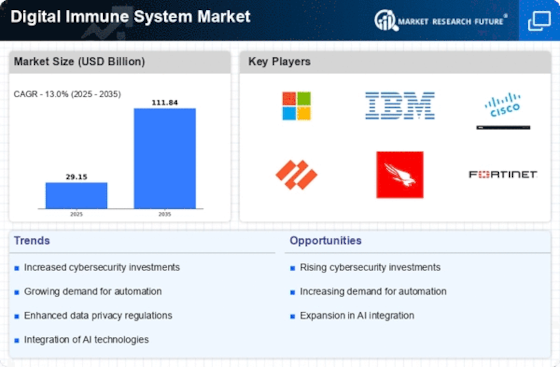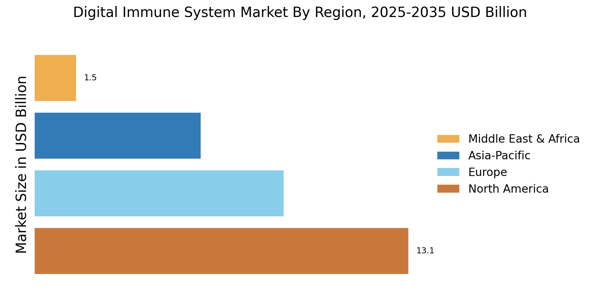Rising Cybersecurity Threats
The increasing frequency and sophistication of cyber threats is a primary driver for the Digital Immune System Market. Organizations are compelled to adopt advanced security measures to protect sensitive data and maintain operational integrity. In 2025, it is estimated that cybercrime will cost businesses over 10 trillion dollars annually, highlighting the urgent need for robust digital immune systems. This market is expected to grow as companies seek solutions that can proactively identify and mitigate risks. The Digital Immune System Market is thus positioned to expand significantly as enterprises prioritize cybersecurity investments to safeguard their assets against evolving threats.
Growing Awareness of Cyber Hygiene
There is a notable increase in awareness regarding cyber hygiene among organizations, which is driving the Digital Immune System Market. Companies are recognizing that human error is a significant factor in security breaches, leading to a focus on training and awareness programs. This shift towards fostering a culture of cybersecurity is likely to result in higher investments in digital immune systems that incorporate user education and behavior monitoring. As organizations prioritize cyber hygiene, the demand for comprehensive solutions that address both technological and human factors will likely grow, further propelling the Digital Immune System Market.
Regulatory Compliance Requirements
Stringent regulatory frameworks across various sectors are propelling the Digital Immune System Market. Organizations must comply with regulations such as GDPR, HIPAA, and PCI DSS, which mandate the implementation of comprehensive security measures. Non-compliance can result in hefty fines and reputational damage, prompting businesses to invest in digital immune systems that ensure adherence to these regulations. The market is projected to witness substantial growth as companies recognize the necessity of integrating compliance into their cybersecurity strategies. As regulations evolve, the Digital Immune System Market will likely adapt to meet these changing requirements, further driving its expansion.
Increased Adoption of Cloud Services
The rapid adoption of cloud computing services is significantly influencing the Digital Immune System Market. As organizations migrate to cloud environments, they face unique security challenges that necessitate the implementation of advanced digital immune systems. The cloud security market is projected to reach 12 billion dollars by 2025, indicating a strong demand for solutions that can protect cloud-based assets. This trend is likely to drive the development of innovative digital immune systems tailored for cloud environments, enhancing the overall security posture of organizations. Consequently, the Digital Immune System Market is expected to thrive as businesses seek to secure their cloud infrastructures.
Technological Advancements in Security Solutions
Technological advancements in security solutions are a crucial driver for the Digital Immune System Market. Innovations such as machine learning, artificial intelligence, and behavioral analytics are enhancing the capabilities of digital immune systems, allowing for more effective threat detection and response. The market for AI-driven security solutions is expected to reach 46 billion dollars by 2025, reflecting the growing reliance on technology to combat cyber threats. As organizations seek to leverage these advancements, the Digital Immune System Market is poised for significant growth, driven by the demand for cutting-edge security technologies that can adapt to an ever-evolving threat landscape.

















